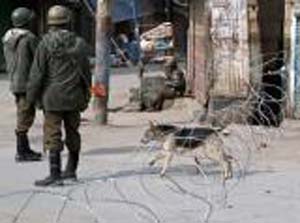Srinagar, Dec 26: Normal life was partially affected across the Kashmir valley on Saturday after separatists called for a shutdown demanding disbanding of Village Defence Committees (VDCs) in Jammu and Kashmir.
 Shops, business establishments, public transport, and banks remained closed in summer capital Srinagar and other district headquarters of the valley. Inter-district public transport was only partially affected due to the strike call.
Shops, business establishments, public transport, and banks remained closed in summer capital Srinagar and other district headquarters of the valley. Inter-district public transport was only partially affected due to the strike call.
Attendance in government offices was thin due to scant availability of public transport here.
Senior separatist leader and chairman of his groups of Hurriyat Conference Syed Ali Geelani had called for strike on Saturday against the VDCs which, he said, had been inflicting "atrocities" on the civilian population.
The strike call was supported by separatist leaders Shabir Shah, Nayeem Ahmad Khan, Aasiya Andrabi, High Court Bar Association Kashmir and others.
Separatist leaders allege that the VDCs have been behaving like "government's private army".
On Thursday a VDC member murdered a woman and her minor son in Budhal area of Rajouri district in Jammu, just days after another VDC member killed a youth leader of regional National Conference (NC) in the Kalakote area of the same district.
VDCs are groups of armed civilian volunteers that were set up by the government in the mid-1990s to tackle militancy in remote villages of the Jammu region, but there are around 196 cases of murder, rape, theft and abduction registered against VDC members.
Opposition National Conference and separatist leaders have demanded disbanding of the VDCs. The state government has ruled out any such move, saying the VDCs have played a major role in stamping out militancy and defending populations in remote and rural areas of the state.





Comments
Add new comment